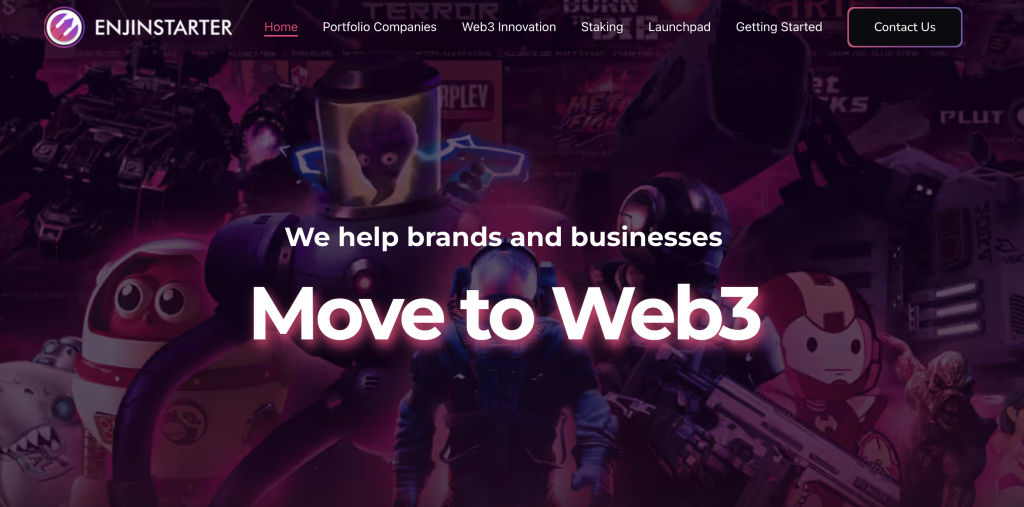80% of Enjinstarter’s launchpad projects succumb to crypto winter
Back in May 2021, Enjinstarter was created as a launchpad for blockchain gaming projects. The platform facilitated initial coin offerings (ICOs), allowing users to invest in upcoming games through their respective crypto tokens.
For developers, ICOs were a way to crowdfund their ideas. For crypto users, they offered a chance to get in early on their favourite projects. If a game were to become popular, its token value would appreciate and ICO participants could reap the benefits by selling their holdings.
Given the financial incentive, ICOs appealed not only to gamers, but traders and speculators as well. Many would invest purely with the intention of selling their tokens in the secondary market.
Throughout 2021 — with blockchain gaming on the rise — ICOs saw a ton of success as a crowdfunding mechanism. Soon, it became common knowledge that there was an abundance of liquidity in this space. Scams became more prevalent, and project founders began walking away with funds without delivering on their ideas.
A year on, the liquidity began drying up and investor interest was all but gone once the crypto winter hit. For Enjinstarter, this revealed a need to rethink its business model. The biggest blockchain games — from Axie Infinity to Pegaxy — were faltering, and the ecosystem as a whole seemed to be in flux.
Beyond blockchain gaming
It signalled a time for Enjinstarter to look beyond gaming and take on other aspects of Web3.
The natural progression when there is a lack of capital is to keep building while you wait for that capital to come.
– Shitij Gupta, CFO of Enjinstarter
The company expanded its focus and started working with infrastructure projects such as Carbon, a Web3 browser with a built-in VPN and an incentive for users to earn crypto tokens while browsing.
More recently, Enjinstarter has also been delving into AI — given recent trends — and is working with ChainGPT, a ChatGPT spinoff which uses real-time data and can create smart contracts.
As far as expertise goes, Gupta explains that the transition hasn’t been a problem. “As entrepreneurs, none of us have experience in gaming. I have experience in investing, that’s my background. I think that’s what we pride ourselves on now — we bank on startups and founders which are investable versus those that are not.”

This line of thinking became key for Enjinstarter after the most recent market downturn. Roughly 80 per cent of the projects which the company helped launch didn’t survive the crypto winter.
“It’s not a figure we’re happy with,” says Gupta. Since then, the focus has shifted to due diligence, extensive vetting, and protecting consumers.
We’re okay with the crypto winter, but we aren’t okay with entrepreneurs abandoning their projects. We make sure now that we carefully pick projects so the community doesn’t have to go through this again.
– Shitij Gupta, CFO of Enjinstarter
As part of its vetting process, Enjinstarter now gives a lot more significance to a project’s team rather than the project itself. “We’ve started looking at entrepreneurs rather than ideas, because entrepreneurs can pivot when an idea doesn’t work or if there’s a lack of money.”
With Web3’s volatile tendencies — as is often the case with emerging markets — it’s tough to put faith in a particular product or use-case. Instead, trusting people — with a proven track record in business and product development — seems to be a safer option.
“We don’t want to get into products, we just want to guide projects into Web3. We’re sector-agnostic,” says Enjinstarter’s Managing Director for MENA, Vasseh Ahmed.
Institutional interest in Web3
As part of its efforts to pivot and diversify, Enjinstarter also launched its own consulting arm in 2022.
With an aim to guide Web2 businesses into Web3, this venture involves partnerships with traditional brands and institutions. For example, Enjinstarter worked with UBS on an NFT collection launch last year.

As far as the general sentiment goes, Ahmed believes that there’s still a lot of scepticism to be addressed.
It depends on the sector, but this is certainly a challenge. For instance, financial institutions always look for regulation. Until the central banks make it clear, they’re generally hesitant to touch anything, whether it’s crypto wallets or on- and off-ramps.
– Vasseh Ahmed, Enjinstarter’s Managing Director for MENA
On the flip side, in regions where regulations are shaping up well, there’s a lot of interest to go around. “In the Middle East, we’re seeing a lot of excitement,” Ahmed explains. “Everyone wants to do digital twins, augmented reality, tokenised real estate.”
Still, there’s a big disconnect to overcome and it comes down to mindset. “From a Web2 business perspective, if there’s no real world utility to the Web3 offering, then it’s not something people are interested in,” Ahmed explains.
“What people don’t realise is that Web3 is utility plus community,” Gupta adds, emphasising the role which ‘community’ plays in Web3. “When you think about Web3, the first and foremost thing to think about is community. That’s the hardest part for Web2 people to understand.”
“The biggest pain point is that product guys only care about building the product and they’ll forget about the community, but that won’t work.”
Featured Image Credit: Enjinstarter
Also Read: “Web3 has potential to revolutionise gaming industry”: Razer’s pushing for blockchain games